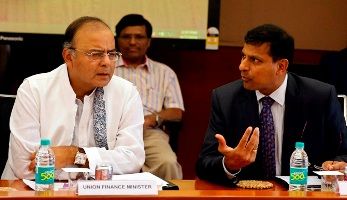We are very respectful of the views of the government: RBI Governor
 In a post-policy interaction with the media, Reserve Bank of India Governor Raghuram Rajan explained the rationale for his policy stance and other issues.
In a post-policy interaction with the media, Reserve Bank of India Governor Raghuram Rajan explained the rationale for his policy stance and other issues.
Edited excerpts:
Pressure from govt to cut rate. . .
(Laughs) The word pressure is perhaps misused.
I think there is a healthy dialogue that goes on.
Obviously, the finance ministry internalises the concerns on inflation and recognises that we are entrusted with the task of controlling inflation and creating sustainable growth.
We are not combatants; we are on the same side.
Sometimes, we have different views and we try to persuade each other.
I think the finance minister has said publicly a number of times that these are my views but ultimately the decision is RBI’s.
We are very respectful of the views of the government and we try and accommodate those views to the extent we can, and then we explain where we can’t and why we can’t. I think it is a cordial relationship and its on every facet, whether on monetary policy or things like debt restructuring.
Why the status quo?
We want to make sure this process (inflation control) is well underway. We have had a couple of months (of easy inflation) after four-and-a-half to five years of high inflation.
So, we are going to make sure this is for real, especially because we don’t intend to do a flip-flop.
Again, if the world changes dramatically or circumstances change dramatically, we will have to respond. We don’t want to follow every piece of information up and down.
We rather change and change for good.
Banks are not cutting rates. . .
Though rates have come down, banks have not passed those on.
The transmission process is still not working as significantly; therefore, one would imagine a fall in short-term rates has not been passed through and an additional rate cut will only have a mild chance.
I would believe there is a signalling effect.
I would believe when banks are confident that rates would come down and stay down, they would start passing through more. For us, reaching that point would signal very strongly about interest rates.
Today is premature but I have laid out the condition where we think we will be in a position to move.
Bond yields are falling in anticipation of a deep rate cut. . .
I don’t think I was trying to signal the magnitude of any action.
What I was saying was that once policy turns, it will not move up and down; there will be a sense that it is in a particular direction.
The size of any action is still contingent on data and so on, but the direction will be uniform. The sequence of moves will be on a consistent direction.
Scrapping of the 80:20 rule on gold imports. . .
We have said in the past that some actions that were put in place to deal with the currency volatility we experienced last summer will be withdrawn over time.
For example, we have increased the limit under the liberalised remittance scheme (after the currency stabilised).
Payment banks and small finance banks. . .
I don’t have a number (on how many licences will be granted), we will have two expert committees that will look into it and give us a set of candidates.
We will go through that also.
My guess is, it could certainly be more than two. We need to ensure there is a variety of participants. I imply a reasonable number.
This will be a full-fledged licensing process and, hopefully, we will get enough applicants.
Banks are to be allowed to have higher equity in debt recast. . .
This is something which banks across the world, including those in India, do.
Banks in India have asked for this as a way of giving greater flexibility. Equity is a form of upside.
The key issue is that the transaction is done at a fair price, so that banks are not overpaying and, at the same time, the minority shareholders don’t get a raw deal. This is what we are discussing with the Securities and Exchange Board of India. . . on how to counter that.
It does not mean banks will take equity in every situation. In some situations, they might prefer not to. But this is giving banks more flexibility.
Steps to improve recovery of non-performing assets. . .
If we can speed up the judicial process, especially the Debt-Recovery Tribunals, I think it will help bring down some of these risk premiums.
So, we need to make sure DRTs work better and there is no excess number of appeals.
The finance ministry has already talked about expanding the number of DRTs. We are working with the ministry to make sure that happens.
Image: Finance Minister Arun Jaitley (L) listens to Reserve Bank of India Governor Raghuram Rajan during a financial stability development council meeting in Mumbai. Photograph: Reuters












 © 2025
© 2025